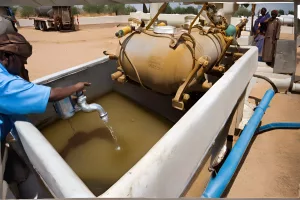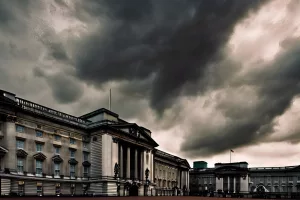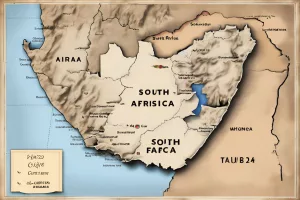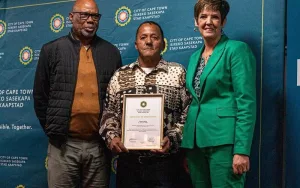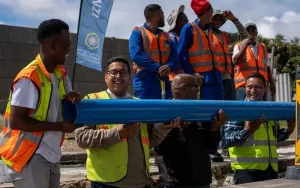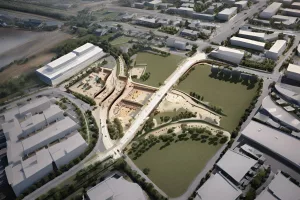Professional golfer Charl Schwartzel and his wife Rosalind are battling breast cancer with hope and resilience. Their experience has transformed into a worldwide force for breast cancer awareness, advocating for early breast cancer detection and raising global consciousness. Their journey is more than a personal fight against cancer; it serves as a platform for advocacy and awareness, highlighting the strength of human resilience and the transformative potential of unity.
Phat Joe, a wellknown media personality, was recently evicted from his luxurious Sea Point apartment due to unpaid rent totaling over half a million rands. Sea Point is a highly soughtafter neighborhood due to its proximity to the beach and mountains, and apartments there can fetch monthly rents ranging from R10,000 to R100,000. Despite the eviction, Phat Joe’s professional journey remains strong, as he holds top positions at media and marketing companies in Cape Town.
On April 25th, a fire broke out in the Kgosi Mampuru II Correctional Facility, causing damage and completely destroying two units. The firefighters bravely battled the flames and saved a lifeless cat. The facility has housed infamous inmates such as Oscar Pistorius and the “Dros rapist,” Nicholas Ninow. The cause of the fire is still a mystery, highlighting the importance of implementing firewalls in infrastructure design.
Cape Town’s Energy, Water and Waste (EWW) Forum brings together the city and local businesses to work towards responsible resource management and sustainability. The forum focuses on innovative solutions to tackle organic waste management challenges and landfill diversion, with the goal of reducing organic waste in landfills by 50% by 2022 and achieving 100% organic waste diversion by 2027. The forum demonstrates the power of shared knowledge and collaboration in driving sustainable change and serves as an inspiring model for cities worldwide.
The Free State’s Active Role in Modifying the General Intelligence Laws Amendment Bill
The Free State community gathered to contribute their suggestions for the General Intelligence Laws Amendment Bill, proposing the appointment of a Deputy Chairperson for the Joint Standing Committee on Intelligence and a Deputy InspectorGeneral of Intelligence, as well as the differentiation between domestic and foreign intelligence services and the establishment of a South African National Intelligence Academy. Youth engagement in matters related to national security and concerns about security challenges experienced by residents were also discussed. Renowned organisations and individuals provided their feedback, with differing opinions on the Bill’s provisions. The Bill is now heading towards its final public hearing in East London.
The City’s Water and Sanitation Directorate is conducting planned maintenance activities to preserve the water supply infrastructure. Zeropressure tests and state evaluations of the water supply network will be carried out from 29th April to 3rd May 2024, with water tankers provided for residents to minimize the inconvenience caused. The City has notified the Stellenbosch Municipality to make alternate arrangements during this maintenance period, and residents are advised to store enough water in clean, sealed containers and keep their taps closed. This initiative reflects the City’s dedication towards ensuring the longevity of its water infrastructure and commitment towards transparency and effective communication.
South Africa’s National Council of Provinces has made significant strides in promoting transparency and accountability in the country’s political system. Two reports were approved, focusing on ethical codes and disclosures of member interests, with harsher penalties suggested for violators. The revised code also aims to tackle ethical issues in social media and proposes riskprofile lifestyle audits. These measures aim to create a more trustworthy and accountable governance system, serving as a model for ethical conduct and representing a key advancement in the political evolution of the nation.
Meghan Markle, the Duchess of Sussex, is facing allegations of misconduct towards her former staff, which her legal team has dismissed as a premeditated attempt to tarnish her reputation. Esteemed royal analyst Tom Bower suggests that there could be more substance to these accusations, and former royal aide Samantha Cohen confirmed her participation in the Buckingham Palaceled investigation into the matter. The unfolding saga offers a glimpse into the intricate dynamics behind palace walls and the trials that come with a public life.
Cape Town’s Mayor is proposing a transformation of law enforcement in the city, expanding the jurisdiction of municipal officers to include crime investigation. This change is seen as crucial in supporting the South African Police Service in tackling escalating issues of gangrelated activities, gun crime, and drug trafficking. Three central reforms include expanding the definition of criminal investigation, endowing municipal officers with additional Peace Officer powers, and giving metros a more impactful role in local policing policies. The initiative is set to be supported by an investment of R138 million in safety vehicles and additional policing measures.
Tensions are rising in South Africa following a vigilante incident involving a group advocating for Cape’s autonomy. The ANC is concerned about the racial tension sparked by the incident, which involved the barricading of the R62 road connecting Eastern and Western Cape. The Cape Independence Party denies any racial charges and claims their intention was an expression of their aspiration for independence. The incident is a violation of human rights and the Constitution, urging state bodies to conduct a comprehensive investigation. The incident has highlighted the brewing political discord and racial tensions within South Africa.
**Remarkable Epoch in Cape Town: Narratives of Perseverance, Adversity, and Progress**
The Urban Mobility Awards in Cape Town celebrate the dedication and remarkable accomplishments of City staff who have devoted many years of their lives to the service of the city. Michael Ohlsson, one of the 105 staff members recognized at the event, started working for the Transport Department when he was just 19 years old and has now spent over 30 years contributing to the city’s growth and progress. The event was attended by notable figures in the city’s administration and celebrated the resilience, adaptability and dedication of longstanding members to the city’s success.
Cape Town’s Water and Sanitation Vision aims to provide dignified water and sanitation services to all residents, with a proposed budget of R5,317bn dedicated to water and sanitation in the financial year of 2024/2025. The plan includes installing new taps and toilets in informal settlements, diversifying water sources, and improving infrastructure and treatment facilities. The city is also committed to building resilience during instances of loadshedding, preserving the environment, and reducing the risk of pollution. This investment signifies a brighter, sustainable future for the city and its inhabitants.
Oscar Pistorius has been released from prison after serving more than eight years for the murder of his girlfriend, Reeva Steenkamp. His return to society has sparked mixed reactions from the public, with some sympathizing with him and others expressing outrage. Social media users have also criticized his physical appearance after prison, with some empathizing with Steenkamp’s mother and others arguing that Pistorius deserves a second chance. Despite the polarizing views surrounding him, Pistorius is forbidden from making any public statements until 2029.
King Charles’ decision to expel Prince Harry from Frogmore Cottage has caused controversy and reignited discussions about privilege and duty within the royal family. Prince Harry’s public display of emotion has been met with criticism by some, while others see it as a reflection of the complexities of privilege, duty, and personal choice. The controversy highlights the ongoing struggle to balance tradition with evolving social expectations within the monarchy.
Nestlé has come under fire for its marketing of sugarladen infant food products, with high sugar content found in some of their products in certain countries. This has led to concerns about rising obesity rates among children in low and middleincome countries. Investigations by Swissbased research organization Public Eye revealed the discrepancy, with the World Health Organisation calling for a ban on added sugar in products for babies and infants under three years old. The scandal highlights the urgent need for a holistic and ethical approach to food production that prioritizes public health over profit margins.
A Significant Milestone: Western Cape High Court Greenlights New Road Construction for Masiphumelele
The Western Cape High Court has approved the construction of a new road connecting Masiphumelele to the wider Noordhoek area, which will provide better access to essential amenities and emergency services, reduce traffic volumes, and counteract flooding risks. The road project, which had been delayed for almost eight years, is expected to bring relief to the community and enhance mobility and selfdetermination. While there were environmental concerns, the City has committed to mitigating any harmful impacts on wetlands and leopard toads, and the project is seen as a beacon of hope for a brighter future.






